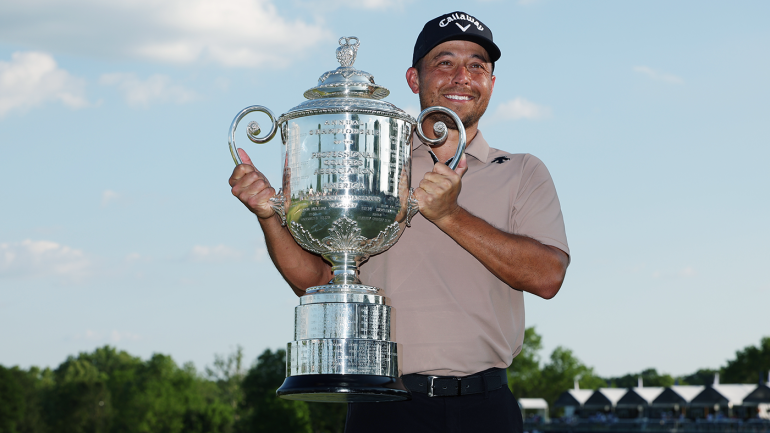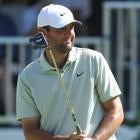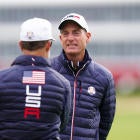
LOUISVILLE -- Narratives change because people never stay the same. That was evident Sunday at Valhalla Golf Club as Xander Schauffele won the 106th playing of the PGA Championship while Bryson DeChambeau, who finished second by a shot, simultaneously won over an entire city with his antics and his play.
It was about this time last week that Schauffele was licking wounds Rory McIlroy inflicted upon him when the latter went out and ran away with the Wells Fargo Championship. But it is Schauffele who had the last laugh -- at least for now -- as he passed McIlroy in the Official World Golf rankings, moving to No. 2 overall after his victory at Valhalla.
It was not a win many predicted.
Even when Schauffele led after 18, 36 and 54 holes, old stories persisted of him being allergic to major championship leads and cowering from the lights when they at their most luminous. How could they not?
Schauffele had sat in first or second entering the final round of a major or The Players Championship three times in his career; he lost all three opportunities. Even worse, he had entered such third rounds inside the top three on the leaderboard three times; he lost all three of those opportunities, too.
"I don't think I'd ever look at it as lacking," Schauffele said of past bruisings. "I looked at it as someone that is trying really hard and needs more experience. All those close calls for me, even last week, that sort of feeling, it gets to you at some point.
"It just makes this even sweeter. I know it's a major, but just winning in general, this is as sweet as it gets for me."
Peers and those around Schauffele's circle have insisted that he had what it takes to win the biggest events; still, evidence to the contrary began to pile up. Such criticism is a privilege, of course. It's not like Tom Hoge, Alex Noren nor Thomas Detry get criticized when they come up short. Just the players who are perceived to be otherwise great; the ones we believe are good enough to be champions.
That is how narratives work.
Others have gone through similar struggles early in their careers. Phil Mickelson comes to mind. Though Lefty has won six major championships, he entered his 34-year-old season on the PGA Tour with a cacophony of hot takes that he simply could not win the biggest events. In retrospect, it makes the murmurs around Schauffele, who is only 30, seem more like whispers.
The question with Schauffele at these big events often became, "How will he lose this one?" After a stunning 31 on the front nine Sunday, it seemed like we got our answer when he made bogey at the second-easiest hole on the course, the 590-yard par-5 10th, after a series of poor decisions and possibly even poorer shots.
But narratives change because people do.
Schauffele birdied the next two holes to regain control of the tournament. Five pars later, and he stood on the 72nd hole knowing that, two pairings ahead of him, DeChambeau had delivered the moment of the tournament to that point. Tying Schauffele at 20 under with a birdie at his 72nd hole, DeChambeau responded with what looked like it was going to be a cartwheel that turned into a hammering fist pump.
BRYSON. CLUTCH.
— Golf on CBS ⛳ (@GolfonCBS) May 19, 2024
He ties the lead with a birdie on 18. pic.twitter.com/r1dR4lXHlc
Changing a narrative is a hell of a way to describe DeChambeau's week, too. The irony of him leaving the PGA Tour to take Saudi Arabian millions only to become the most beloved he has ever been by golf fans is as amusing as it is confusing.
Yet here we are.
It is impossible to overstate how pro-Bryson the Louisville crowds were this week. On Sunday, they poured into every crevice of the property and hollered encouragement after each of his shots. Resounding shouts of, "Try to shoot 50 today, Bryson!" and "world's greatest YouTuber!" replaced what used to be jeers when he teed off.
(I did not hear, as Bryson purported at the Masters earlier this year, anyone yelling that they are grateful for what he does online. But the shouts were not far off.)
DeChambeau delivered the Valhalla crowd a show because he is, at his heart, a showman. His narrative has changed because he has changed. He understands now that he has two gifts: He is amazing at golf, and he is a world-class entertainer.
DeChambeau now has an outlet for both -- the former at major championships and the latter on his YouTube channel where he often tries to do crazy things like hit 215 miles-per-hour ball speed or break 50 from forward tees.
"It's actually funny; YouTube has helped me understand that a little bit more," DeChambeau explained about his altered mentality of embracing big moments and delivering joy to fans. "When the moment comes, knowing what to do, what to say, how to act is really important. You know, when I was younger, I didn't understand what it was. Yeah, I would have great celebrations and whatnot, but I didn't know what it meant and what I was doing it necessarily for. Now, I'm doing it a lot more for the fans and for the people around and trying to be a bit of an entertainer that plays good golf every once in a while."
That is how careers go. They ebb and flow. You learn how to play majors and how to celebrate them, too.
Schauffele's tee shot on No. 18 did not get a great result. With his feet in a bunker up the left, he had a hanging lie from which the ball could have flown a number of different directions. Instead, he hit a big, hooking rope that ended up in a perfect spot to get up and down for birdie, the all-time major scoring record and the PGA Championship.
He stepped into a stunning silence given the size of the crowd on Sunday and drove a low, spinning chip right up next to the hole. It was a dagger into the championship itself.
That is how narratives die.
"Definitely a chip on the shoulder there," Schauffele said of the narrative surrounding his play. "It just is what it is at the end of the day. You guys are asking the questions, probing, and I have to sit here and answer it. It's a lot easier to answer it with this thing sitting next to me now, obviously. It's just fuel, fuel to my fire. It always has been growing up, and it certainly was leading up to this."
One day we may look back at Schauffele's career and laugh at anyone ever believing he was unable to close out a big-time tournament. He might win three or four or five of these. That's how good he is.
But there will only ever be one victory that ended the narrative. Schauffele doing it with a 65 when the player ahead of him -- potentially breaking a narrative of his own -- shot 64 makes it even more satisfying and legitimate.
"It's just noise," Schauffele concluded. "That's what I think. I thought I was [good enough to win a major]. Not that people saying it made me think that. I just felt like I've done enough work, I'm good enough to do it. I just needed to shut my mind up and actually do it."
All major winners are champions. That's how majors work. Not all of them flip narratives like Schauffele did Sunday at Valhalla. In 18 holes of golf, he went from "best who can't win the big one" to "actually, maybe he's going to win a lot of them."
That's how drastically this major result shifted the trajectory of Schauffele's career.
His narrative changed because he did something he's never done before. He closed out the best in the world when it mattered the most.
It's hard to imagine erasing a narrative any more definitively than that.
Rick Gehman, Greg DuCharme, Patrick McDonald and Mark Immelman recap the 2024 PGA Championship at Valhalla. Follow & listen to The First Cut on Apple Podcasts and Spotify.





















